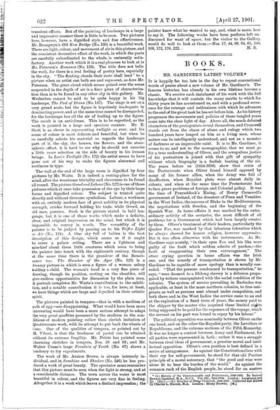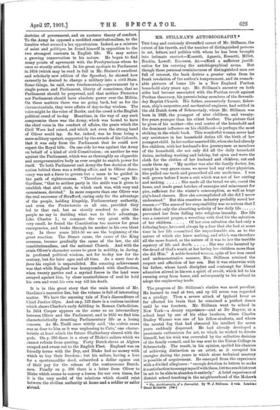BOOKS.
- MR. GARDINER'S LATEST VOLUME.* IT is happily far too late in the day to repeat conventional words of praise about a new volume of Mr. Gardiner's. The famous historian has already in his own lifetime become a classic. We receive each instalment of his work with the full knowledge that it will contain the many merits to which for thirty years he has accustomed us, and with a profound rever- ence for the courage and enthusiasm with which he advances to the end of the great task he has set before him. As his history progresses the movements and policies of those tangled years come into the clear light of day. Above all, the much-debated characters of the protagonists reveal themselves, and Cromwell stands out from the chaos of abuse and eulogy which two hundred years have heaped on him as a living man, whose nature can be intelligently understood, and not as a monster of darkness or an impeccable saint. It is to Mr. Gardiner, it seems to us, and not to the monographist, that we must go for a true understanding of Oliver, and the scrupulous justice of his portraiture is joined with that gift of sympathy without which biography is a foolish beating of the air. The years before us (1654-1656) show that crisis of the Protectorate when Oliver found himself opposed by many of his former allies, when the Army was full of disaffection, when Royalist plots were almost daily in- cidents, and when at the same time the Protectorate had to face grave problems of foreign and Colonial policy. It was the time of Penruddock's Rising, of Henry Cromwell's government of Ireland, of the disasters of Penn and Venables in the West Indies, the success of Blake in the Mediterranean, the negotiations with Sweden, and the beginning of the Spanish War. In home affairs it was marked by the extra- ordinary activity of the sectaries, the most difficult of all problems for a Government which had been largely createci by them. Oliver's treatment of their leaders, particularly the Quaker Fox, was marked by that laborious toleration which he always showed for honest religion, however aggressive. But it was often otherwise with his instruments. As Mr. Gardiner says acutely, "in their eyes Fox and his like were guilty of the fault which seldom admits of pardon,—the fault of exaggerating their own extravagances." The other crying question in home affairs was the Irish one, and the remedy of transportation is shown by Mr. Gardiner to be capable of more apology than is usually con- ceded. "That the persons condemned to transportation," he says, "were doomed to a lifelong slavery is a delusion propa- gated by writers unacquainted with the social condition of the colonies. The system of service prevailing in Barbados was applicable, at least in the more northern colonies, to free emi- grants as well as persons sent abroad under compulsion, and both there and in the West Indies the service came to an end at the expiration of a fixed term of years, the money paid to the shipper by the master who acquired these limited rights being supposed to be paid for the expenses of the voyage, which the servant on his part was bound to repay by his labour."
The political opposition was nominally between Oliver on the one band, and on the other the Royalist party, the Levellers or Republicans, and the extreme sections of the Fifth Monarchy. It was no longer a contest between Army and Parliament, for all parties were represented in both ; rather it was a struggle between rival ideas of government, a genuine moral and intel- lectual opposition. Oliver's own position is best defined in a series of antagonisms. As against the Constitutionalists with their cry for self-government, he stood for that old Puritan principle of a moral autocracy, that "the good and wise were alone fit to bear the burden of the world." As against the common luck of the English people, he stood for an austere
• (1.) History of the Commonwealth and Protectorate, 16494880. By Samuel
Rawson Gardiner, D.C.L. VoL /11., 16544646 London Longmans and go. [141a,]—(51.) Speeches of Olivyy Cromwell, 1644-1858. Collected and Edited by Charles L. Stainer, M.A. London Henry Frowde. [6] doctrine of government, and an austerer theory of conduct. To the Army he opposed a modified constitutionalism, to the fanatics what seemed a lax opportunism. Indeed, as a mixture of saint and politigue, he found himself in opposition to the two strongest currents in English life. We may notice a growing conservatism in his nature. He began to find many points of agreement with the Presbyterians whom he once so stoutly attacked. In his great apologia to Parliament in 1654 (which may be read in full in Mr. Stainer's excellent and scholarly new edition of the Speeches), he showed bow earnestly he desired to change a military into a civil State. Some things, he said, were fundamentals,—government by a single person and Parliament, liberty of conscience, that no Parliament should be perpetual; and that neither Protector nor Parliament should have absolute power over the Militia. On these matters there was no going back, but as for the circumstantials, they were affairs of day-to-day wisdom. The voice might be the voice of Burke, and the creed is the English political creed of to-day Meantime, in the way of any such compromise there was the Army, which was bound to have the chief voice in the conduct of affairs, the genie which the Civil Wars had raised, and which not even the strong hand of Oliver could lay. So far, indeed, was he from being a mere military upstart, supported by the swords of his Colonels, that it was only from the Parliament that he could now expect the Royal title. On one side he was against the Army on behalf of a kind of civil Constitution ; on another he was against the Parliament, which was as thoroughly an oligarchic and unrepresentative body as ever sought to snatch power for itself. To both Parliament and Army the free decision of the nation behind them was a trifling affair, and to Oliver demo- cracy was not a force to govern but a mass to be guided in the path of righteousness. "Therefore it was," says Mr. Gardiner, "that to neither party in the strife was it given to establish that civil state, to which each was, with very real earnestness, devoted." In more respects than one Oliver was the real successor of Strafford, caring only for the advantage of the people, holding kingship, Parliamentary authority, and even the Protectorate as all one, provided they led to that end, but as stoutly resolved to give the people no say in deciding what was to their advantage. Like Charles I., to compare the very great with the very small, he found the Constitution too narrow for great emergencies, and broke through its meshes in his own blunt way. In these years 1654-56 we see the beginning of the great reaction. The Stuart cause, the cause of the King overseas, became gradually the cause of the law, the old constitutionalism, and the national Church. And with the crisis Oliver's character seems to grow in nobility, in daring, in profound political wisdom, not for to-day nor for the century, but for later ages and all time. As a mere tour de force his exploit is unparalleled. His amazing achievement was that while England was honeycombed with disaffection, when twenty parties and a myriad forces in the land were arrayed against him, by sheer masterfulness of soul he held his own and went his own way till his death.
It is in this great story that the main interest of Mr. Gardiner's narrative lies, but the volume is full of interesting matter. We have the amusing tale of Fox's discomfiture of Chief Justice Glyn. And on p.123 there is a curious incident which shows Charles's early dabbling in Roman Catholicism. In 1654 Cooper appears on the scene as an intermediary between Oliver and the Parliament, and in 1655 we find him characteristically deserting Parliamentary life as a losing concern. As Mr. Traill once wittily said, the victris cause was as dear to him as it was unpleasing to Cato,' one charac- teristic at least which the future Shaftesbury shared with the gods. On p. 386 there is a story of Blake's sailors which we cannot refrain from quoting. Forty Dutch slaves at Algiers escaped and swam out to the English Fleet. England was on friendly terms with the Dey, and Blake had no money with which to buy their freedom ; but his sailors, having a love for a sportsmanlike deed, subscribed a dollar apiece out of their pay for the release of the venturesome Dutch- men. Finally on p. 396 there is a letter from Oliver to Blake which seems to convey a lesson for our own times, for it is the very model of the relations which should exist between the civilian authority at home and a soldier or sailor abroad.























































 Previous page
Previous page